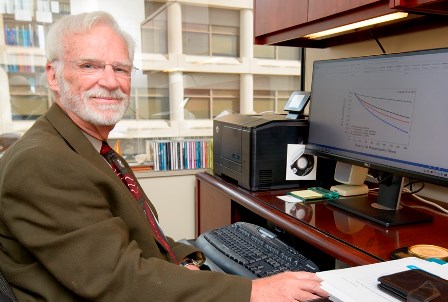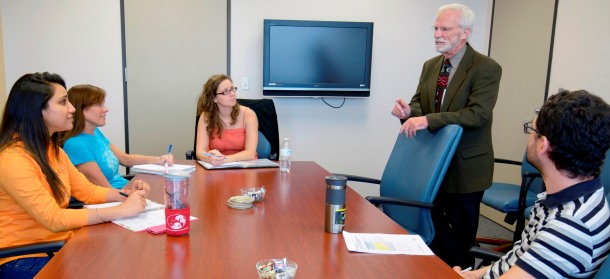
The Moody Philanthropies
Funding Education and Traumatic Brain Injury Research
 |
| Kenneth J. Ottenbacher, PhD, OTR, holds the Russell Shearn Moody Distinguished Chair in Neurological Rehabilitation. |
The profound desire to make a difference, as well as to heal and improve people’s lives, are among te ideals that drive Galveston’s Moody philanthropy. The Moody Endowment, Inc. and The Moody Foundation have granted more than a billion dollars toward education, research and health care.
That remarkable generosity includes the foundations’ transformational support of traumatic brain injury research and rehabilitative care of brain injury patients. The Moody Foundation established Galveston’s Transitional Learning Center, where more than 20,000 brain injury patients have restored their lives and regained independence.
At The University of Texas Medical Branch at Galveston (UTMB), The Moody Foundation contributed $9 million for researchers to uncover novel treatments for both chronic and acute traumatic brain injury. Also at UTMB, The Moody Endowment, Inc., committed a lead gift of $500,000 to establish the Russell Shearn Moody Distinguished Chair in Neurological Rehabilitation.
Named for Robert L. Moody’s son, Russell, who was seriously injured in an automobile accident, the Moody Distinguished Chair provides crucial support for a “number of areas associated with neurological work,” said UTMB’s Kenneth J. Ottenbacher, PhD, OTR, who is the holder of the endowment.
Ottenbacher joined UTMB in 1995 and wears many hats for the university. He is a professor, director of Rehabilitation Sciences, director of the Center for Recovery, Physical Activity and Nutrition and associate director of the Sealy Center for Aging.
Funds from the chair, Ottenbacher said, are crucial for graduate education and research in rehabilitation, disability and recovery at the university. The endowment allows Ottenbacher to build research capacity among doctoral students and post-doctoral fellows focused on traumatic brain injury (TBI) research.
Recently, Monica Watford, a doctoral student, received support for her work related to older minority adults with such injuries. The Moody Distinguished Chair enabled her to present her research findings to the North American Brain Injury Society, an organization dedicated to the needs of multidisciplinary professionals in brain injury.
Funds from the Moody Distinguished Chair have supported the annual Galveston Brain Injury Conference, a major event which draws renowned TBI experts from around the globe to the island. The Moody Distinguished Chair has also enabled Ottenbacher to secure needed funding for his research related to rehabilitation, disability, frailty and minority health in older adults.
 Dr. Ottenbacher’s research has found that social support—or lack thereof—is an important predictor of hospital readmissions.
Dr. Ottenbacher’s research has found that social support—or lack thereof—is an important predictor of hospital readmissions.
Whether or not a patient has adequate support can be factored into discharge plans and used to identify patients who could benefit from services designed to prevent hospital readmission, such as home health services.
This is a significant finding, says
Dr. Ottenbacher, because such information is not currently included in data sets that could influence health policy.
Ottenbacher is the principal investigator, co-investigator or leader of seven federally-funded research projects. Among these projects are two grants from the Department of Health and Human Services (National Institutes of Health and Agency for Community Living) which fund studies examining hospital readmission and disability outcomes related to post-acute care. Such research is timely. Hospital readmission rates have received increased attention because of the Patient Protection and Affordable Care Act. These rates are used as a benchmark to measure the quality of care delivered by hospitals providing acute care.
Research indicates that 20 percent of all Medicare patients are hospitalized within 30 days of discharge from acute care. The majority of those readmissions are preventable and highly costly, resulting in $17 billion in costs each year.
Attention will soon focus on the care provided by post-acute facilities, like rehabilitation centers and nursing homes, once penalties for those soon begin to take effect. Such facilities and vulnerable patient populations have been among the central themes of Ottenbacher’s research for several years. He hopes to develop predictive models that help identify patients at risk for rehospitalization among those in high-cost impairment groups receiving post-acute care. Studying these patients will have considerable implications for controlling health care costs as the U.S. population continues to age.
“There are wonderful research opportunities right now in studying health outcomes related to disability and rehabilitation,” Ottenbacher said. “We’re going through really dramatic changes in health care. When we look back in 20 years, we will see that this was a time when major shifts occurred in the delivery and evaluation of health care services. We are excited to be part of this process.”
If you would like more information about how to start an endowment, please contact Betsy B. Clardy, CFRE, at bbclardy@utmb.edu ♦ (409) 772-1991